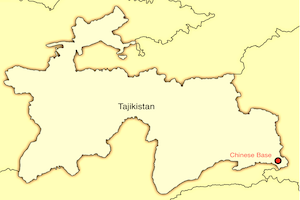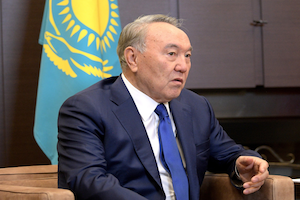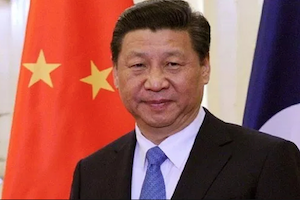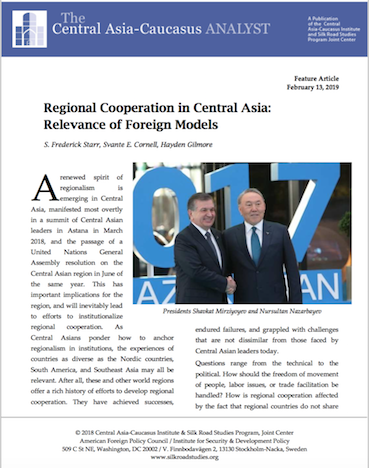China's Military Base in Tajikistan: What Does it Mean?
By Stephen Blank
April 18, 2019, the CACI Analyst
The Washington Post recently reported that China has an operating military base in Tajikistan, confirming earlier accounts of this base and opening a window on China’s interests and strategic developments across Central Asia. However, China may have a second base situated in the Wakhan corridor of Afghanistan. Chinese forces have been present there since 2017, around the same time that the base in Tajikistan became functional. The newly discovered base, along with the base in Djibouti and the possible base in Afghanistan, reflects the pressures building from within the PRC and PLA to project military power beyond China’s borders, e.g. in the South China Sea.

Kazakhstan's President Resigns at a Moment of Political Tension and Uncertainty
By Natalia Konarzewska
March 22, 2019, the CACI Analyst
In February 2019, Kazakhstan saw a wave of protests triggered by various social and economic grievances. Rallies burst through the country in multiple locations, indicating that popular distress is strong and unlikely to fade soon. In an attempt to placate social discontent, President Nursultan Nazarbayev fired the government, citing its inability to improve living standards and announced his own plan to provide social relief for the families. Kazakhstan’s hydrocarbon-dependent economy is struggling to recover after the 2014 plunge in oil prices and the spillover effects of Western sanctions against its largest trade partner Russia. On March 19, president Nazarbayev announced his immediate resignation after ruling Kazakhstan for thirty years.

Protecting BRI: China's Foreign Security Concerns
By Sudha Ramachandran
March 14, 2019, the CACI Analyst
In November 2018, Baluch militants, angry with China’s exploitation of their resources through Belt and Road Initiative (BRI) projects, attacked the Chinese consulate in Karachi, Pakistan. This underscored the vulnerability of Chinese nationals and infrastructure projects outside China’s borders to terrorism. In addition, China’s repression of Muslim Uighurs in its Xinjiang province has drawn the ire of Uighur militants and jihadist groups. China will have to find a way to secure its nationals abroad and projects in BRI member-states, without triggering alarm among BRI skeptics.

Wither Afghanistan? The Great Game Takes a New Turn
By Stephen Blank
February 13, 2019, the CACI Analyst
When he announced the withdrawal of U.S. troops from Syria, President Trump also announced the departure of one half (7,000) of America’s troops in Afghanistan. This abrupt decision both damaged the U.S. position in the Middle East and undermined ongoing negotiations with the Taliban over Afghanistan. It upset all the calculations of the Afghan government, leaving it scrambling for a new negotiating and strategic posture, and undid two years of successful albeit modest U.S. policy of renewed economic and political support for Central Asia. This will allow both Beijing and Moscow to respond by extending their influence in Central Asia at America’s expense and to employ their strongest capabilities for doing so.

Regional Cooperation in Central Asia: Relevance of Foreign Models
Regional Cooperation in Central Asia: Relevance of Foreign Models
A renewed spirit of regionalism is emerging in Central Asia, manifested most overtly in a summit of Central Asian leaders in Astana in March 2018, and the passage of a United Nations General Assembly resolution on the Central Asian region in June of the same year. This has important implications for the region, and will inevitably lead to efforts to institutionalize regional cooperation. As Central Asians ponder how to anchor regionalism in institutions, the experiences of countries as diverse as the Nordic countries, South America, and Southeast Asia may all be relevant. After all, these and other world regions offer a rich history of efforts to develop regional cooperation. They have achieved successes, endured failures, and grappled with challenges that are not dissimilar from those faced by Central Asian leaders today.
Questions range from the technical to the political. How should the freedom of movement of people, labor issues, or trade facilitation be handled? How is regional cooperation affected by the fact that regional countries do not share the same patterns of membership in international organizations? How deeply institutionalized should regional structures be? How do they relate to outside powers, particularly large ones and potential hegemons? These questions are the focus of the following sections.




